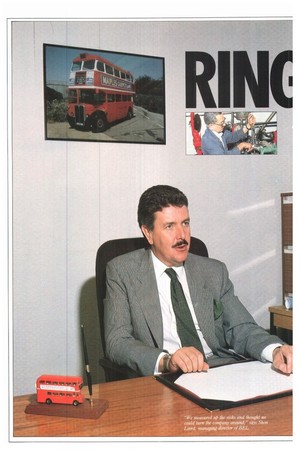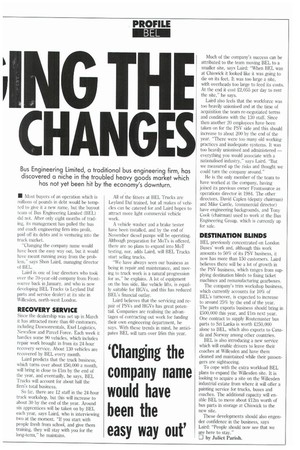NC
Page 46

Page 47

If you've noticed an error in this article please click here to report it so we can fix it.
NG THE CHANGE
Bus Engineering Limited, a traditional bus engineering firm, has discovered a niche in the troubled heavy goods market which has not yet been hit by the economy's downturn.
IN Most buyers of an operation which is millions of pounds in debt would be tempted to give it a new name, but the buyout team of Bus Engineering Limited (BEL) did not. After only eight months of trading, its management has pulled the bus and coach engineering firm into profit, paid off its debts and is venturing into the truck market.
"Changing the company name would have been the easy way out, but it would have meant running away from the problem," says Shon Laird, managing director of BEL.
Laird is one of four directors who took over the 70-year-old company from Frontsource back in January. and who is now developing BEL Trucks (a Leyland Daf parts and service dealer) at its site in Willesden, north-west London.
RECOVERY SERVICE
Since the dealership was set up in March it has attracted more than 60 customers, including Dawsonrentals, Exel Logistics, Newsflow and Parcel Force. Each week it handles some 90 vehicles, which includes repair work brought in from its 24-hour recovery service. About 130 vehicles are recovered by BEL every month.
Laird predicts that the truck business, which turns over about i!50,000 a month, will bring in close to £1m by the end of the year. and eventually, he says, BEL Trucks will account for about half the firm's total business.
So far, there are 12 staff in the 24-hour truck workshop, but this will increase to about 30 by the end of the year. Around six apprentices will be taken on by BEL each year, says Laird, who is interviewing two at the moment. "If you start with people fresh from school, and give them training, they will stay with you for the long-term," he maintains.
All of the fitters at 131,2L Trucks are Leyland Daf trained, but all makes of vehicles can be catered for and Laird hopes to attract more light commercial vehicle work.
A vehicle washer and a brake tester have been installed, and by the end of November diesel pumps will be operating. Although preparation for MoTs is offered, there are no plans to expand into MoT testing, nor, adds Laird, will BEL Trucks start selling trucks.
"We have always seen our business as being in repair and maintenance, and moving to truck work is a natural progression for us," he explains. A lot of equipment on the bus side, like vehicle lifts, is equally suitable for IIGVs, and this has reduced BEL's financial outlay.
Laird believes that the servicing and repair of PSVs and HGVs has great potential. Companies are realising the advantages of contracting out work for funding their own engineering department, he says. With these trends in mind, he anticipates BEL will turn over £6m this year.
Much of the company's success can be attributed to the team moving BEL to a smaller site, says Laird: "When BEL was at Chiswick it looked like it was going to die on its feet. It was too large a site, with overheads too large to feed its costs. At the end it cost £2,055 per day to rent the site," he says.
Laird also feels that the workforce was too heavily unionised and at the time of acquisition the team re-negotiated terms and conditions with the 130 staff. Since then another 20 employees have been taken on for the PSV side and this should increase to about 200 by the end of the year. "There were too many old working practices and inadequate systems. It was too heavily unionised and administered — everything you would associate with a nationalised industry," says Laird. "But we measured up the risks and thought we could turn the company around."
He is the only member of the team to have worked at the company, having joined its previous owner Frontsource as operations director in 1984. The other directors, David Caplen (deputy chairman) and Mike Cantle, (commercial director) have engineering backgrounds, and Tony Cook (chairman) used to work at the Bus Engineering Group, which is currently up for sale.
DESTINATION BLINDS
BEL previously concentrated on London Buses' work and, although this work amounts to 50% of its PSV business, it now has more than 150 customers. Laird believes there will be a lot of growth in the PSV business, which ranges from supplying destination blinds to fixing ticket machines and remanufacturing gearboxes.
The company's trim workshop business, which currently accounts for 10% of BEL's turnover, is expected to increase to around 25% by the end of the year. The parts exports business should bring in £500,000 this year, and 21m next year. One contract to supply Routemaster bus parts to Sri Lanka is worth £250,000 alone to 13 EL, which also exports to Canada and Norway among other countries.
BEL is also introducing a new service which will enable drivers to leave their coaches at Willesden and have them cleaned and maintained while their passengers are sightseeing.
To cope with the extra workload BEL plans to expand the Willesden site. It is looking to acquire a site on the Willesden industrial estate from where it will offer a painting service for trucks, buses and coaches. The additional capacity will enable BEL to move about £12m worth of bus parts in storage at Chiswick to the new site.
These developments should also engender confidence in the business, says Laird: "People should now see that we are here to stay."
by Juliet Parish.
































































































